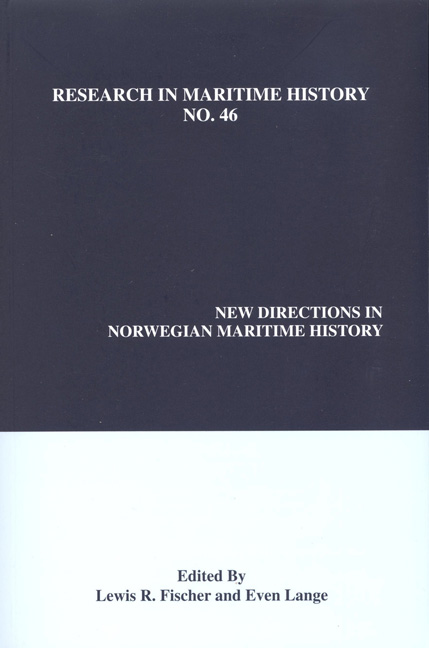Book contents
- Frontmatter
- Contents
- About the Editors
- Contributors' Notes
- Introduction
- Global Integration
- Political Issues
- “In a Peculiar Position: Merchant Seamen in Norwegian Health Policy, 1890-1940”
- “The Norwegian-American Line: State Incentives and Mediations with Dominant Market Players”
- “After the Boom: The Political Economy of Shipping in Norway in the Interwar Period”
- Success and Failure
“In a Peculiar Position: Merchant Seamen in Norwegian Health Policy, 1890-1940”
from Political Issues
- Frontmatter
- Contents
- About the Editors
- Contributors' Notes
- Introduction
- Global Integration
- Political Issues
- “In a Peculiar Position: Merchant Seamen in Norwegian Health Policy, 1890-1940”
- “The Norwegian-American Line: State Incentives and Mediations with Dominant Market Players”
- “After the Boom: The Political Economy of Shipping in Norway in the Interwar Period”
- Success and Failure
Summary
An analysis of the health policies directed at seamen can deepen our understanding of their position in society and how they were perceived. Policies concerning seamen's health have been shaped by forces emanating from both the maritime world and agencies ashore. Broader developments in public health laid the groundwork for the provision of health services to seamen, but seamen were seen as marginal figures by many health professionals. Their mobility, long absences and age and gender profiles made them elusive targets for public health measures. This situation was depicted in 1951 by Karl Evang, the director of the Norwegian Directorate of Health and co-founder of the World Health Organization:
From almost every point of view – social, economic and medical – the seafarer occupies a peculiar position…Public health experts will know that it is not sufficient to apply the same rules and provide the same facilities for seafarers as for the population on shore.
Policies to improve the health of seamen have been largely ignored by scholars, but an intriguing essay by the British historian Sally Sheard did analyze health policies in the port of Liverpool between 1875 and 1939. Sheard noted that the measures adopted for seamen were influenced mainly by a desire to protect the population ashore from contagion. The Port Sanitary Authority (PSA) saw seamen as a risk to the city's inhabitants. From 1874, the PSA concentrated on detecting the presence of infectious diseases, especially cholera, plague and yellow fever, among seamen landing in Liverpool. In the first two decades of the twentieth century, Liverpool's policies shifted to focus on venereal diseases (syphilis and gonorrhoea), and seamen were provided with free, easily accessible treatment. Sheard stressed that while other diseases caused problems for seamen, they were ignored by the PSA.
Sheard depicted the well-being of seamen as a field where the interests of public health were often more important than the status of those who served at sea. Inspired by her study, I decided to examine Norwegian health policies toward seamen to see whether attitudes were similar. To what extent did seamen occupy a “peculiar position?” Were the health measures adopted really aimed at protecting the shore-based population? Using Norwegian sources, this essay addresses these questions.
- Type
- Chapter
- Information
- New Directions in Norwegian Maritime History , pp. 83 - 100Publisher: Liverpool University PressPrint publication year: 2011



